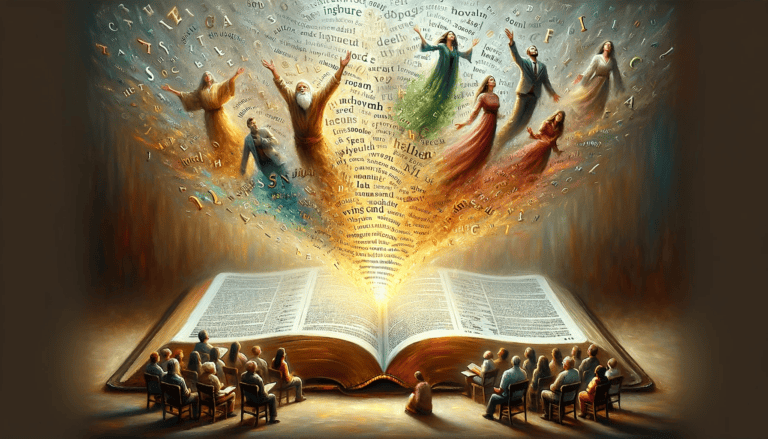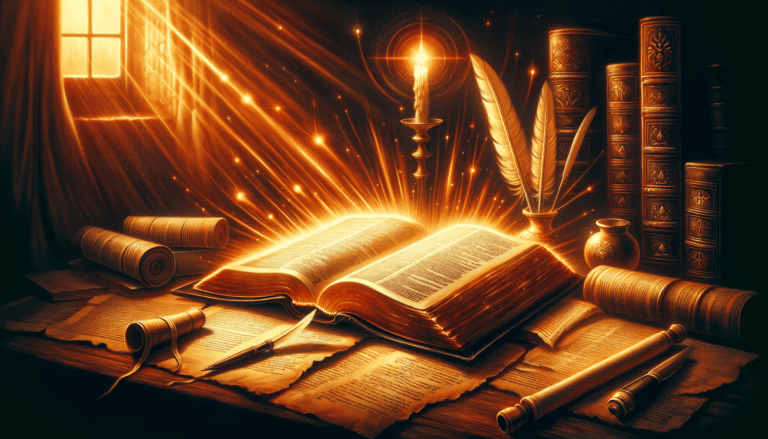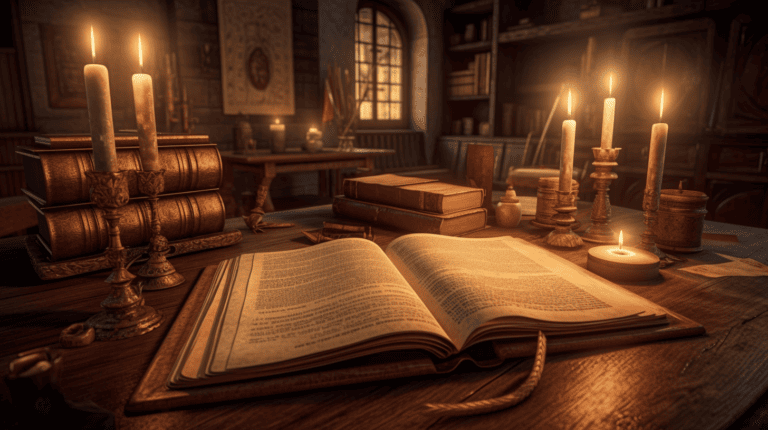Why Do Modern Translations of the Bible Have a Copyright?
Have you ever picked up a Bible and noticed it says “copyright” on one of the first pages? This might seem strange. After all, isn’t the Bible a very old book that’s free for everyone to read? Many Bibles today are new versions that people have worked hard to create.
The idea behind copyright is like building a fence around a garden. It keeps others from taking fruits and veggies without asking, which in this case are the words in the Bible.
People who make new Bibles spend lots of time and money on them. They want to make sure no one else can copy their work without permission. Just like artists protect their paintings or musicians protect their songs, these publishers put copyrights on their Bibles so they control who can share or print them.
Sometimes folks get upset thinking new Bibles change what the ancient text says, while others think making different versions helps more people understand its message. Not all Bibles have copyrights though – some older ones like King James Version (KJV) don’t because they’re super old and belong to everyone.
Bible translations with copyrights usually mean you need to ask if you want to use parts of them somewhere else, but each publisher has its own rules about how much is okay before you need permission.
Reading these modern translations shows us how words written so long ago still matter today – just be ready for an adventure into why there’s always that little ‘©’ next to those holy verses! Keep reading; there’s plenty more surprises waiting inside!
Understanding Copyrights in Modern Bible Translations
Some people think a book as old as the Bible would be free for everyone to copy and share. But it’s not that simple with modern translations. These newer Bibles have copyright because teams of experts work hard to understand ancient languages and put them in today’s words.
They spend years studying texts, comparing notes, and making sure they get it just right so that when someone reads about Jesus or Isaiah, they are reading something true to the original.
Think about artists who make beautiful paintings or write songs—they want to keep control over their creations, right? It’s like that with Bible translators too. They need copyright to keep their translation safe from being copied without saying “thank you” or paying anything back for all the effort put into it.
This way, publishers can sell these modern Bibles and use that money to help create even more translations or support other important works like teaching people how to read.

The Reason for Copyrights in Modern Bible Translations
Imagine pouring your heart, soul, and countless hours into crafting a modern translation of the ancient Scriptures. It’s quite the divine task—one that demands tireless scholarship and meticulous attention to linguistic detail.
This herculean effort isn’t just for spiritual kudos; it’s wrapped up in the practicalities of our world where intellectual property rights are king, and even holy texts aren’t immune to the realm of copyright protections.
Costs and Efforts of Translation Projects
Making a new Bible translation takes a lot of work and money. Teams of scholars who love the Word of God spend years studying ancient texts. They want to make sure they get every word right.
The work doesn’t end with the last verse; next comes checking, editing, and printing. All this costs a bunch.
Publishers put these Bibles out into the world hoping many will read them. But they also need to pay bills and keep doing good work. So, they use copyright law to protect their translations.
This helps make sure that when people buy a Bible, part of that money goes back to cover all those costs from before. It’s not just about making profit; it’s also about keeping the translation quality high for everyone who reads it.
Restrictions on Quoting and Reprinting
A modern Bible translation is like a painting that took years to finish. The artists, or translators in this case, work hard on each word and sentence. They want their work to be just right.
Because of this effort, they set rules for how other people can use their translation. You can’t just take a picture of the painting and sell it, right? It’s similar with these Bibles.
The creators have rights under copyright laws. These laws say you can only share certain parts without asking first. Think about a special recipe; you won’t give it out to everyone because it’s your own creation! Bible publishers feel the same way about the verses and chapters they’ve put together.
If you want to use more than what’s allowed, you usually need to get permission first.

The Role of Bibliolatry in Modern Bible Translations
Some people love the Bible so much, they almost treat it like God Himself. This is called bibliolatry, and it’s causing a big fuss about which Bible version is best. People who only want the King James Version say those other Bibles with copyrights aren’t really pure; they have too many human words mixed in.
On top of this, Christians sometimes fight over these different Bibles. They can’t agree on which old writings are the right ones for making new English translations. It’s like everyone wants their favorite to be the one true copy, but none of them can win that battle.

Public Domain Translations Vs. Copyrighted Translations
Dive into the realm of sacred texts where the timeless tales of morality and divine wisdom sit comfortably in the public domain, yet modern articulations, replete with fresh linguistic garb, claim a space fenced by copyright laws; to unearth more about these contrasting worlds of scripture accessibility, keep reading.
King James Version (KJV) and American Standard Version (ASV)
Let’s step into the realm of biblical texts and shine a light on the age-old King James Version and the American Standard Version. These tomes of divine guidance sit in the public domain, free as the birds in the sky. No strings of copyright tangle their holy words, leaving them open to all, a feast of spiritual nourishment without a gatekeeper in sight.
| Translation | Copyright Status | Year of Publication |
|---|---|---|
| King James Version (KJV) | Public Domain | 1611 |
| American Standard Version (ASV) | Public Domain | 1901 |
Heirs to ancient wisdom, these versions echo through time, beacons of a copyright-free past. They whisper tales from the days when the written word was a treasure of the commons, a shared heritage not bound by the modern constraints of exclusive ownership.
Conclusion
In the end, making a new Bible version takes lots of work and money. Copyrights help those who do this hard job keep their rights. They make sure no one can just take and use the translation without asking.
It’s not just about rules; it’s also about respecting the people who spend time making these books for us to read. So when we pick up a modern Bible, remember someone’s sweat and smarts made it happen!
FAQs
1. What does it mean when a Bible translation has a copyright?
When a modern translation of the Bible has a copyright, it means that the people who made that version have legal rights to their work. They decide how it can be used and shared.
2. Why can’t I use any Bible version I want for free?
Some new translations of the Bible are not free because they are owned by rights holders. These owners spent time and money making these Bibles, so they have rules about how you can use them.
3. Are all versions of the Bible copyrighted?
No, not all versions are copyrighted. For example, the King James Version (KJV) is old enough that it’s in the public domain and anyone can use it without permission.
4. Can I still share verses from modern Bibles if they’re copyrighted?
Yes, you can share verses like John 3:16 from modern Bibles under ‘fair use’. This lets you use small parts without asking for permission first but be careful about using too much!
5. Who makes sure nobody breaks copyright laws with new Bible translations?
In places like the United States, there’s something called U.S. Copyright Law which helps protect translators’ work on texts such as The New International Version or English Standard Version (ESV).
6. Did someone translate every single book of the Bible again to get these copyrights?
Teams of scholars carefully translated each book of The Holy Bible into newer versions or editions like The New American Standard or Catholic Bibles to make them easier to understand today while keeping true to original meanings.





